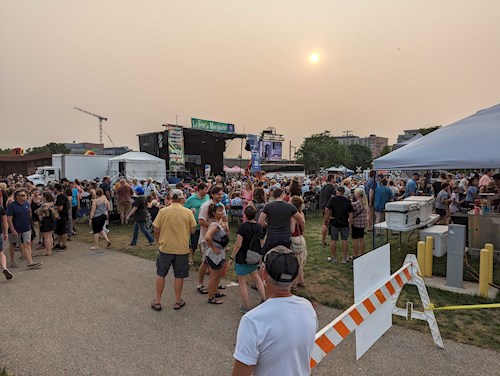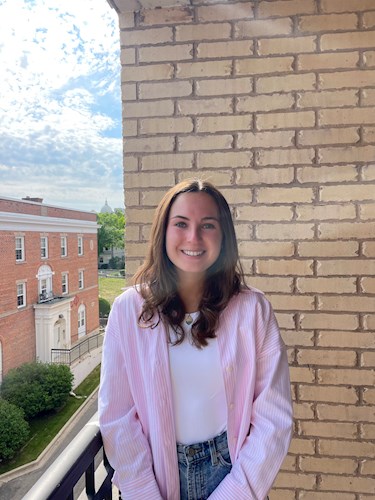

As residents Dane County we are acclimated to long, bitter, winters, with the summertime months always gleaming in the back of our minds and get us through March blizzards and April flurries. But, is that sparkle of excitement leaving our “how to get through Wisconsin winter” tool pack?
This summer we have seen hazy air, felt burning eyes and throats, and have been stuck inside avoiding the worst of the poor air quality days. Coupled with the extreme heat we are currently experiencing, chances are you have had conversations at work and with friends and family about this summer's persistent climate-related events. It can be frustrating to feel the gap getting smaller between thinking of climate change as a future problem and something we are now living with every day. That’s where we come in - not only to help you understand how your every day experiences are tied to climate, but to energize you around opportunities for climate action.
As nearly 900 wildfires blaze from Canada’s east to the west coast, air quality alerts have been prominent in over 30 states across the United States this summer. Wisconsin has been heavily affected because plumes of smoke from the fires have funneled over us by wind patterns. Canada is accustomed to a typical wildfire season lasting from spring until fall, but this season has been unusually fierce. Wildfires have made headlines repeatedly over the past decade, but the poor air quality and the scope of its personal effects this season is unprecedented. Recently, it has become part of my routine to check in on my family members who suffer from asthma, and I know I am not alone in feeling this weight of worry.
In addition to poor air quality, much of our state is experiencing moderate to extreme drought conditions. There has been a 25 to 50% decrease in rainfall in the past two months. Added to this, daily high temperatures have stuck in the 80s for most of July, and we are coming up on temperatures in the 90s for consecutive days at the end of the month. This extreme heat being felt here but also all over the U.S. is “virtually impossible” without climate change.
Extreme heat can be dangerous, especially for more vulnerable populations such as young children, people above 65, individuals who live alone, those without access to air conditioning, people with disabilities, and non-English speaking individuals. I encourage you to frequently check in on those around you. Ready Wisconsin is a great resource to check out for tips and information. Extreme heat is responsible for more deaths than any other weather event, so take these tips seriously!
Poor air quality, drought, and heat waves are impacting every corner of the nation. On top of these relentless events, another climate-related struggle that is co-occuring in Wisconsin right now is a spongy moth outbreak. The spongy moth, previously known as European Gypsy Moth, is an invasive species that threatens our urban trees and forests, which provide vital benefits like reducing the heat island effect (helpful during extreme heat conditions!) and increasing air quality. Every 10-15 years, it is normal to see an increase in the spongy moth population. We are currently in the middle of one of these periods with a reported increase of 102%. However, because we are also experiencing drought and extreme heat conditions, our trees are much more vulnerable to infestation. Think of how humans are more at risk from a common cold when their immune system is already working overtime - it’s the same idea here. Check out our new webpage for more information about the outbreak and access to resources about how to protect your trees.
This pile-up of unprecedented events makes for a memorable summer- though not in a good way. As a passionate and optimistic environmentalist, I would like to offer some advice. Seeing and utilizing silver linings is an approach to challenges I have used to grow during tough times. Using this strategy in reaction to recent headlines is a strategic way for climate enthusiasts to recruit a diverse and strong team equipped to approach our climate crisis holistically. So use this crazy summer as a push to make the change you’ve been thinking about lately. Whether you start a compost system in your home, start biking to work instead of driving, or even switch to an electric vehicle, take this as an opportunity to join the movement toward a more sustainable future in whatever way you see fit for you. Then celebrate your win with the people around you, and become a catalyst for positive change that helps the future of our planet.

Kate is a junior at UW-Madison who is passionate about exploring the intersection of climate action and various stakeholders such as local businesses. She is pursuing degrees in Marketing and Management and is working towards a certificate in Sustainability. Kate is looking forward to learning more about developing strong campaign strategies such as the Climate Action Plan.
The Dane County Office of Energy & Climate Change maintains this blog as a way to offer:
To be sure that you don't miss new blog entries, subscribe to our email updates.